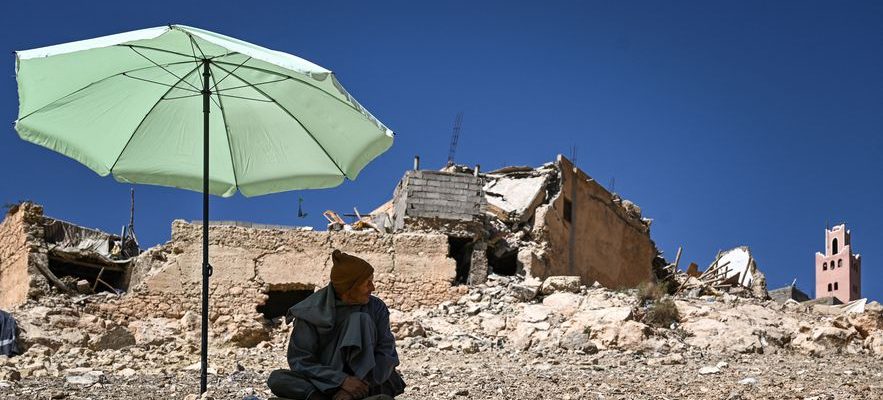“When we leave Marrakech, we immediately have the impression of returning to the past. We have the feeling that the distance which separates the city from its hinterland is not a few kilometers, but several decades…”, says Karim Bukhari, journalist at the le360 information site and former editor-in-chief of the magazine As is. “I traveled through Al Haouz [à l’épicentre de la zone sinistrée] few months ago. I went to a village where the inhabitants had a drinking water problem. The village was nevertheless nestled opposite a magnificent dam… The whole paradox of Morocco is there.” In these massifs of the High Atlas, after this new earth jolt, all that remains of the houses of yesterday are piles of reddish clay stones. And the prayers of those who remain, in a deeply religious country where Islam and the king reign.
The magnitude 7 earthquake that struck the Al Haouz region affected “both extremely poor rural areas and, at the same time, the country’s major tourist capitals, Agadir and especially Marrakech. The two Moroccos are there”, notes Pierre Vermeren, author of the work Morocco in 100 questions (Tallandier) and professor of history at Paris I. On the other hand, a flamboyant, urban, modernized country, showcase of the status of regional power desired by Mohammed VI, monarch for nearly twenty-five years. On the other hand, “areas where there is nothing, where you have to travel at least 100 kilometers to access a hospital. There is often only one access road, and generally it has been cut off by the earthquake”, deplores, from Rabat, Omar Brousky, journalist and academic. For Karim Boukhari, “the residents feel a surge of national solidarity, which is sincere and which does a lot of good. But their problems are old and go back well before the earthquake. The Haouz lags behind in development, the douars and the villages suffered in silence, long before the earthquake.
At the intersection of these two realities is the common feeling of national pride. Demonstrated once again. The country – or rather the king – wanted to demonstrate its ability to take charge of the disaster, sometimes causing incomprehension, particularly in France. “Morocco does not want to appear as a state that does not have resources, like Haiti or Bangladesh,” comments Omar Brousky. “The Moroccan State is not in distress, it is in a situation where, despite the difficulty, it wants to show, and perhaps first of all to itself and to its population, that it is capable of “come out alone or almost. Like a grown-up”, confirms Karim Boukhari. Only a few friendly countries were able to deliver relief and food to an extremely deprived population. “Monarchies above all”, points out Pierre Vermeren. In the Middle East, Qatar and the United Arab Emirates. In Europe, Spain supports Rabat’s plan for Western Sahara and England, perhaps in defiance of the European Union, with which the kingdom is at odds.
Small villages perched in the mountains near Marrakech remain only a pile of clay stones.
© / PHILIPPE LOPEZ / AFP
The king, only recourse
Was the government right to be choosy about the choice of aid, at the risk of leaving a feeling of desertion among the population, in “this Morocco below”? “The average Moroccan feels abandoned,” considers Omar Brousky, quite critical of the relative silence of the sovereign in the hours following the cataclysm, while he was on a private trip to Paris. “When there is a tragedy, the institutions which have democratic legitimacy such as Parliament or the government step aside to leave its place to the king, who seems to be the only recourse,” explains Omar Brousky. Did the population expect to see ministers parade? “There is an unwritten rule which wants the head of state to be the first to ‘appear’, says Karim Boukhari. This rule corresponds to a reality: in the event of disaster or misfortune, the population demands the king, nobody else.”
Beyond the immediate response to the tragedy, Mohammed VI will be judged above all on the capacity for rapid reconstruction, both urgently and over the long term. “Very quickly, as there are going to be storms and autumn rains, these hundreds of thousands of inhabitants will have to be rehoused in a somewhat sustainable manner for the winter, and there will undoubtedly be an issue of cooperation for France in this second phase”, notes Pierre Vermeren, who thinks that a certain number of indicators give hope for a reconciliation with France. For the editorialist Karim Boukhari, “literally and figuratively, the roads of Haouz are perhaps too narrow, too damaged, to allow the passage of everyone… Afterwards, in a second phase, when it comes to rebuild, rehabilitate, open up, develop, we will perhaps find French companies.”
Especially since, like the rest of the region, the kingdom is suffering the impact of the international situation: energy shock, shortages, low growth in Europe and therefore low investments. At the center of this equation, however, remains the question of Western Sahara. Regarding this vast desert and disputed area in the south of the country, Rabat’s expectations are unambiguous: either one is in the “friendly” camp, showing its support for the autonomy plan for the region within the framework of Moroccan sovereignty, or one belongs to the “enemy” camp, maintaining good relations with Algeria, which supports the independence activists of the Polisario Front.
After the Pegasus wiretapping affair, after the visa war, a new act in the Franco-Moroccan relationship is playing out these days. On the Rabat side, the message appears clear. If France wants to find its place in post-earthquake Morocco, it will have to play the game according to the rules decreed by the king.
